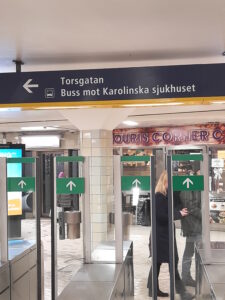As a citizen of the last place on earth to get television, life here in Sweden is full of discovery, explorations, and exclamations for me. Even a routine public transport journey to the hospital generates a feeling of awe, admiration and loss; awe and admiration when I see the efficient and well spread public transport network of Stockholm but also a feeling of loss when I think of Bhutan’s capital city, Thimphu. If only we had also invested in a robust public transport network for Thimphu, we would not be grappling with congestion and pollution.
But I categorize these emotions as surface layer feelings. What I would like to explore here in this note is a deeper layer of feelings that I experienced after a journey by bus and subway to the Karolinska Hospital recently.
As someone with a poor sense of direction, I get lost in the urban maze and more so in the labyrinthine web of an underground subway system. The Buddhist accepts life on earth as a cyclic existence and quite a lot thus far in my life have I gone in circles in New Delhi, New York and in Stockholm. So it was with a great sense of gratitude that I saw a very helpful sign at my last subway stop on the way to the hospital. On my way out of the underground as I scanned the numerous signage, I noticed one that was custom made for me. The Bhutanese Buddhists would probably describe it as an auspicious sign. The sign pointed the way to the bus stop for the Karolinska hospital. I was overwhelmed with a sense of gratitude and relief when I found the bus stop. It was a very auspicious sign for me.
After my check up, I made my way back home. During the journey the auspicious signage encounter at the subway station triggered a wave of thoughts as I began to reflect on my life here in Sweden.
As members of the Swedish Bhutan Society would have noticed, there is a marked difference in signage here in Sweden and Bhutan, both quantitatively and qualitatively. The relative absence of marketing billboards in Bhutan is a refreshing sight for travellers coming from nations where advertising is such a strong part of daily life. Even during the elections in Bhutan, candidates and parties must use designated display boards to place their campaign posters.
In my time as a radio and TV journalist, the focus was very much on transitioning towards a democratic monarchy. This included voter education, rights, participation and empowerment. But it would be wrong to say that I was not exposed to advertising. But it was not the commercial kind. Even today, the casual visitor will notice the almost pervasive presence of religion in Bhutan. The Kuensel newspaper in 2015 reported that that there could be over 2,000 lhakhangs(temples) and 10,000 chortens(stupas) across the country.
Many years ago, when I was about to embark on a trek in Bhutan, a kind gentleman told me that if I encountered chortens on my way, I would not be that far off the mark. Chortens some of which are centuries old are reliquaries that house sacred objects but also served a practical purpose as the modern-day equivalent of GPS markers. Many were built by families with the express aim of benefitting sentient beings.
This is what opened the floodgates of my emotions on my return journey from Karolinska. Unlike Bhutan, the offices here in Sweden are bereft of spirituality. Even the churches appear more on the design side than the divine. The differences are stark and unsettling. But does that mean that the society has lost the ability and the character of love, care, and compassion when it becomes a sophisticated developed nation such as Sweden?
I am not qualified to answer the above question but would like to share my own experiences and understanding.
The sign at the Stockholm station which helped me find the bus stop to the hospital is a tiny part of a well thought out huge public transport system. But this tiny part showcases an important component incorporated by Swedish service providers. Elevators and wheelchair accessibility are physical proof of making the system inclusive. Signs such as the one that helped me are physical but help people like me who need assistance with finding their way.
A lot of what I read and studied in my SFI courses were about navigating and finding the way through Sweden as a country and as a society. As much as the chortens in Bhutan stand in spirituality, they also help travellers confirm their journey like GPS markers. The sign at the subway is functional but also contains features of aid, guide, and service. That in my country would be described as for the benefit of sentient beings but here in Sweden it would be very much in the samsaric realm of inclusivity.
It is autumn as I write these thoughts. When I am done writing, I will wear my rubber boots and carry my mushroom collection ensemble. Under a tree, I will find that someone has taken the time and energy to lay a generous spread of apples for the wild animals who come close to human habitation for food. I will think of the hospitals and libraries where the toilets are disabled friendly. I will think of the toilets with designated bins for disposals of sanitary pads with some even offering free ones.
In a corner of a library, I will see a retired man practising Swedish with a newly arrived immigrant. These impressions may not even register for a Swede. But coming from Bhutan, these impressions are auspicious signs for me. Small signs that enrich the journey that we call life.
Tshewang Dendup

